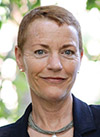Religious orders aid and advocate for migrants
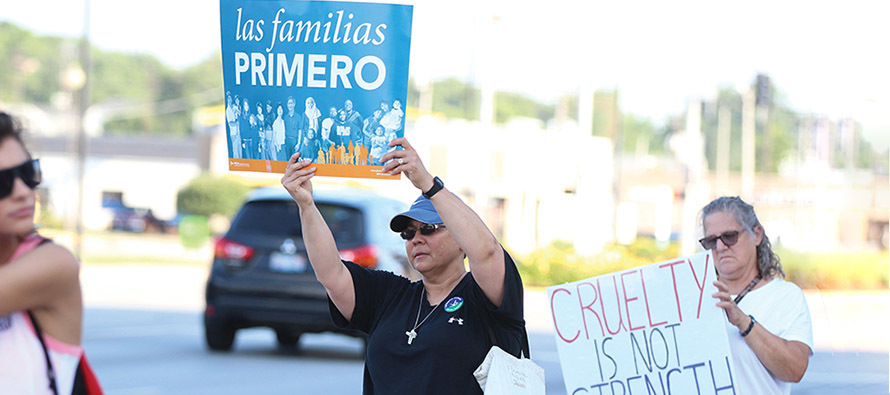
Sister Joni Luna, S.P. (left) takes part in a demonstration of solidarity with migrants, immigrants, and refugees. (Photo courtesy of Sisters of Providence, Saint Mary-of-the-Woods, IN.)
THROUGHOUT U.S. HISTORY, religious orders have responded to the needs of migrants, immigrants, and refugees who have landed on the country’s shores or arrived at its borders. Most recently, at the border between the United States and Mexico, Catholic sisters, priests, and brothers have helped newcomers with food, medicine, clothing, spiritual comfort, and advocacy. With the outbreak of COVID-19, they were also quick to respond to the safety and health needs of these vulnerable groups.
In all of this they are not alone. The U.S. Conference of Catholic Bishops has issued multiple statements in defense of the human rights of migrants, immigrants, and refugees, and bishops have encouraged the faithful to press for more humane policies.
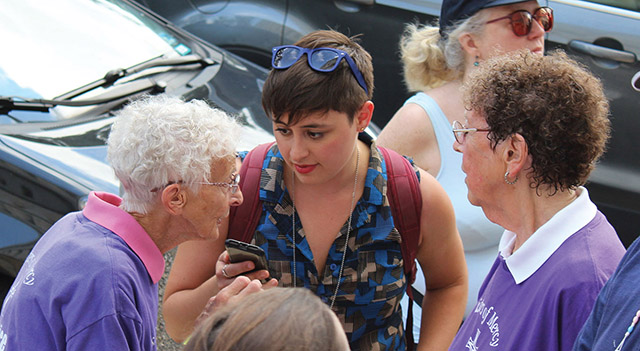
“You have to do something”
Sisters of Mercy JoAnn Persch and Pat Murphy were patted down, handcuffed, and hauled away, much like the immigrants they were praying for. It was the Catholic Day of Action for Immigrant Children on July 18, 2019, in Washington, D.C. The sisters—aged 85 and 90, respectively—were sanguine about it.
“You have to do something,” Persch told the Chicago Tribune after their release. “The little bit of discomfort we felt that day is so minimal to what the immigrants go through.”
These two Mercy Sisters know plenty about what immigrants go through. Back home in Chicago, they have been involved in immigrant outreach and activism for years. Although most people in their 80s and 90s are retired, Persch and Murphy volunteer at a homeless shelter, visit detained immigrants, participate in weekly prayer vigils, and do political advocacy. Being handcuffed and taken into custody was not a new experience for the two sisters.
“We are brothers and sisters, and it doesn’t make any difference the color of our skin or our religion or the country we come from,” Murphy told the Tribune. “We are our brothers’ and sisters’ keepers. It’s a human family.”
Brother Todd Patenaude, F.M.S. (right) takes people from the United States to the Mexican border for an immersion program that helps participants better understand the issues affecting refugees, immigrants, and migrants. Mexican and U.S. Marist Brothers work together to offer the learning experience. (Photo courtesy of the Encuentro Project.)
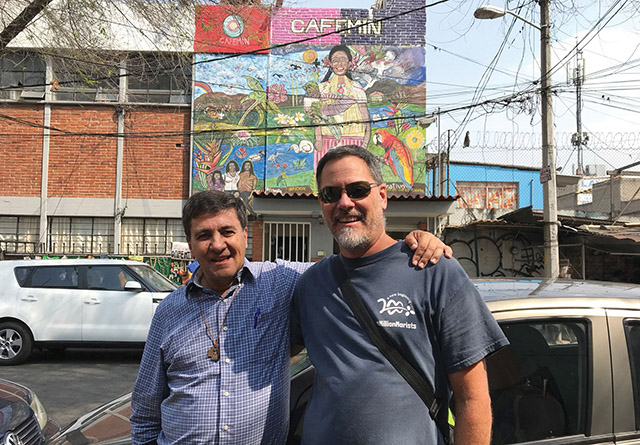
Meeting migrants in real life
The lunch table grew quiet as a young mother shared details of her dangerous journey north. She had left her home in Honduras, with her three little boys in tow, hoping to reach safety in the United States. They had arrived in Juarez, Mexico—just shy of the border—when the children were kidnapped.
The crowd at the table included guests of the Encuentro Project, a border immersion program. The project allows guests to meet migrants and learn their stories while helping in shelters. One of the project’s founders, Marist Brother Todd Patenaude, F.M.S., remembers one guest well.
“This man had called himself a ‘very conservative judge from a very conservative state,’ ” Patenaude remembers. “But he was open. He was profoundly affected by her experience.” The family was reunited when their U.S. sponsors paid the $8,000 ransom.
“I really believe encounter opens people’s eyes,” Patenaude says. “One woman said, ‘It’s hard to hate up close.’ It is. You see migrant families and you realize they’re just like you.”
Patenaude says he’s grateful to have been given the time and resources by the Marist Brothers to study and respond to the problem. “Our charism is about serving the ‘least favored.’ I couldn’t have done it alone.”
The project—a collaboration of the Marist Brothers, Jesuits, the Sisters of St. Francis of the Holy Family, and Archdiocese of El Paso—began in 2018.
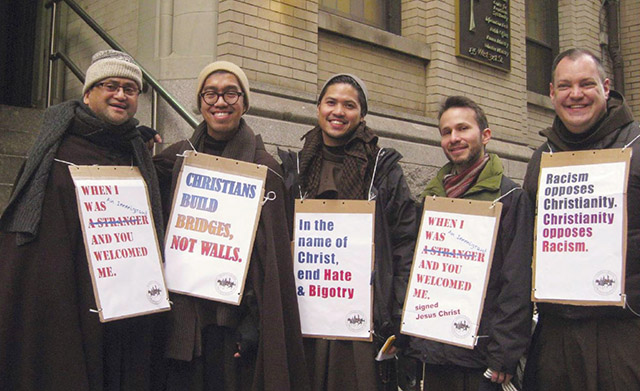
Immigrant outreach: Calling within a calling
Helping immigrants navigate an often-treacherous road to survival is the daily work of Father Julian Jagudilla, O.F.M., executive director of the Migrant Center of New York. One story in particular stands out for him.
A young undocumented immigrant had come to the United States to work, sending money home to his impoverished mother. He hadn’t risked visiting her in at least 10 years. He knew that—without documentation—he might not be able to return.
“We were able to help him get the documentation he needed,” Jagudilla says. “He had been gone so long that she didn’t recognize him at first. When he told her who he was, she broke down and cried. It was a resurrection story.”
Migrants come to the Franciscan-supported center for help with legal issues and other services. Jagudilla says his ministry as executive director helps him as much as it helps them.
“It helps me fulfill my vocation as a friar to be welcoming of all people,” he explains. “It’s a great opportunity to witness the gospel.”
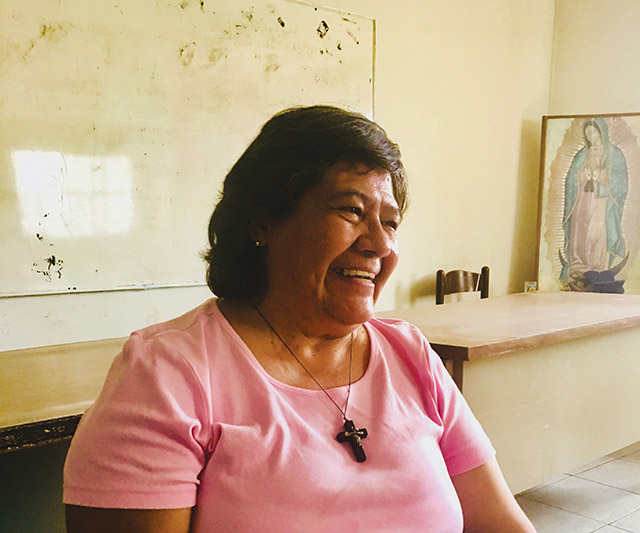
Family ministry at the border
Maria Antonia Aranda Diaz was in her 40s when she left her career as an engineer to become a Sister, Servant of the Immaculate Heart of Mary (or I.H.M. Sister). She thought she would devote her time to family ministry, helping couples work on relationships and guiding children to read Bible stories. Her path took another turn entirely.
Aranda has joined Catholic sisters, brothers, and priests who have gone to the U.S.-Mexico border to minister to the migrants there. These religious have responded to the humanitarian crisis caused by thousands of asylum seekers arriving at the border and being denied entrance or access to asylum application. The problems have been compounded by the serious health issues of COVID-19. Aid from men and women religious has ranged from meeting immediate needs for food and medicine to spiritual solace for those who have been traumatized.
It is a modern-day Bible story, Aranda told Time magazine: “Starting from Genesis, we’re talking about migration, no? The people of Israel, the Hebrews, they walked through the desert,” she said. “Matthew speaks of love for the needy.”
Now 60, Aranda serves in a different kind of family ministry than she had once imagined, working to help migrants join their families across the border. She calls it “a great joy and satisfaction . . . knowing that, in some way, our work is helping other people find happiness.”
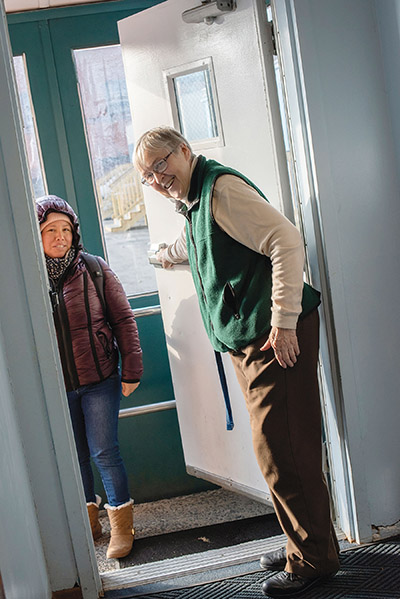
Healing broken hearts
Anunciata’s life didn’t get off to a great start. Growing up in a physically and emotionally abusive household in Guatemala, she also lived in a violent atmosphere outside her home, thanks to car bombings and the ever-present threat of the military. She saw the remains of a close friend who had been hacheted to death.
Anunciata’s harrowing escape led, finally, to Philadelphia. There, she found safety and belonging at the Aquinas Center, a former convent located in the heart of a poor, mostly immigrant neighborhood. She also found Sister Mary Kennedy, O.S.F.
“Classes with Sister Mary have helped me learn new coping techniques,” Anunciata (not her real name) told Good News, a publication of the Sisters of St. Francis of Philadelphia. “My life has been transformed.”
Whether leading a class called Healing Our Hearts or introducing young parents to each other in her peer-based Parenting Café, Kennedy says the most important tool she uses is her ears. “When people see that they are being listened to and respected, they begin to trust.”
Kennedy’s latest Aquinas Center project is in immigration legal services, helping with such tasks as citizenship applications, deportation defense packets, and immigration interviews. She also helps locate family members who have been picked up in immigration raids.
Before serving at the center, Kennedy lived and served in Guatemala. Her cross-cultural experience has encouraged immigrants to trust her. The lynchpin to her ministry, says Kennedy, is this: “My faith is a large part of my life. I wouldn’t be able to do a fraction of what I do without it.”
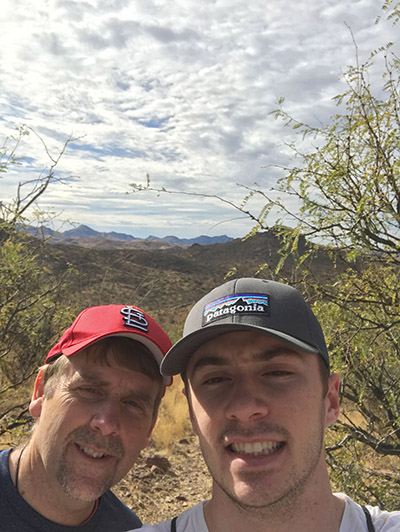
A radically altered life
The journey of Father Corey Brost, C.S.V. from button-down Catholic high school principal to T-shirted pilgrimage leader, runs through southern Arizona, along dusty trails lined with cactuses and pockmarked with memorials to migrants who have died.
“I came down to help lead another group in 2015, and it was such a powerful experience that it radically altered my life,” Brost says about his involvement in border issues. “I asked my Viatorian community for permission to leave the high school so I could devote myself full-time to immigration issues. They said, Go. We support you.”
Brost began leading students and young adults twice a year from Tucson, Arizona to Nogales, Mexico. They talk with migrants, border patrol guards, desert guides, and shelter volunteers.
“We leave our comfort zones to search for God in the desert,” Brost says. “We walk into the experiences of people who live through this human-rights tragedy of migration. We ask: How does our faith intersect with it? The young people say the pilgrimage humanizes the complex issue of immigration. It connects human suffering with our Catholic teaching.”
When Brost is not leading the twice-a-year pilgrimages, he oversees Viator House of Hospitality in Des Plaines, Illinois (near Chicago), a ministry to young men awaiting asylum who would otherwise be incarcerated in county jails. All year long, in one form or another, Brost and the Viatorian religious community pay attention to migrants, immigrants, and refugees.
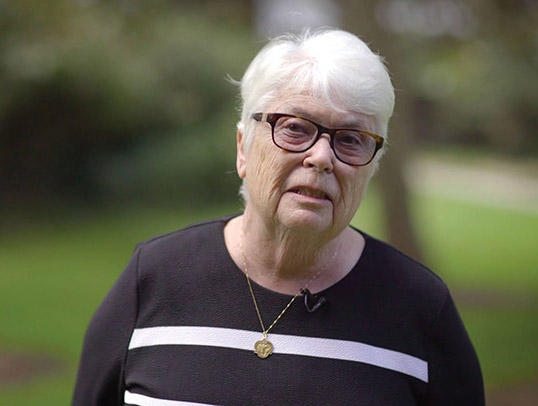
Using legal expertise to aid refugees
One case still haunts Sister Ann Durst, S.H.C.J., a lawyer and co-founder of her congregation’s Casa Cornelia Law Center in San Diego. The center has helped scores of migrants gain critical legal assistance. It is there she first met “Sara.”
Sara had fled El Salvador to try to escape the brutal gangs responsible for murdering, trafficking, and disappearing many of her fellow Salvadorans. On arrival in the United States, she was put into detention and kept there for three years.
“Sara’s case was challenging and compelling,” Durst says. “Although she had a well-founded fear of returning to El Salvador, she was ultimately deported. She said, ‘If I can get out of the airport, I’ll be okay.’ I heard from her once, so she got out. But I have no idea where she is now.”
In retrospect, Durst regrets that although this was perhaps her best legal work, she did not prevail. She does not regret, however, the investment of time representing Sara. “Any time you can push back the darkness with truth, you let in the light. It’s good work.”
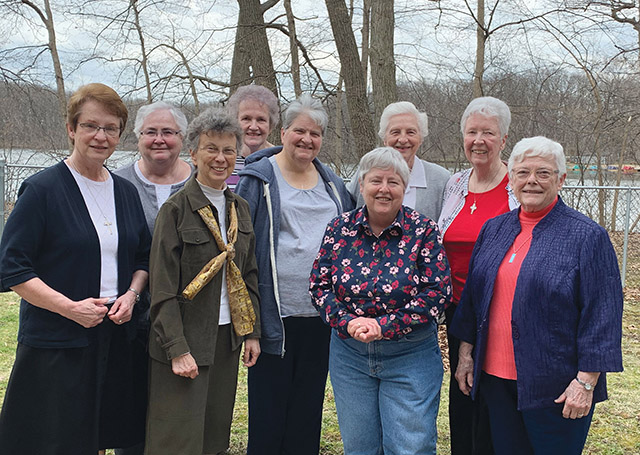
“For now, we are her family”
More than a dozen communities of women religious have worked together in Illinois to create a place of safety for asylum-seeking young women who have aged out of federal children’s detention centers. Female asylum seekers, ages 18-22—who would otherwise have been shackled and taken to adult detention centers—are instead being welcomed into Bethany House of Hospitality in the Chicagoland area.
“ ‘Elizabeth’ arrived in the U.S. alone after her father died crossing the Rio Grande,” Dominican Sister Kathlyn Mulcahy, O.P. says of one Bethany House guest. “Efforts to find her remaining family in Angola have been unsuccessful, but she holds out hope. For now, we at Bethany House are her family as she works on her high school diploma.”
Mulcahy serves as a live-in house coordinator on the weekends while other sisters take over her duties during the week.
“Being here at Bethany House is a way to stand in solidarity with women from around the world,” Mulcahy states. “They are living signs of the brokenness of our world, yes, but they are also living signs of hope and courage working to overcome that brokenness. Their lives here proclaim that a new story is possible, one where women from around the world live and work together to support one another and bring new possibility into being.”
Tags
Related
- Religious communities have deep and diverse roots
- Scientific wonder is God’s handiwork
- Respite and renewal brought to you by religious communities
- Lives that lead to God: Biographies and memoirs
- Rural religious take to the highways and byways
- Divine design: The holiness of place
- More prayer spaces of religious communities
- Word as witness to the Word
- More poems by religious
- Vocation takes cultivation Read More
Most Viewed
- Find your spirituality type quiz
- FAQs: Frequently asked questions about vocations
- Celibacy quiz: Can you live a celibate life?
- Resources for older discerners or those with physical and developmental differences
- About Vocation Network and VISION Guide


